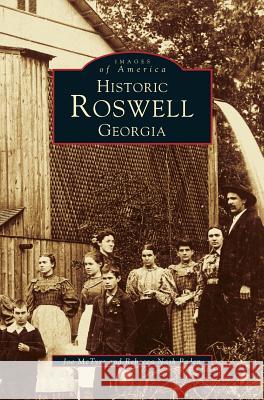Historic Roswell: Georgia » książka
Historic Roswell: Georgia
ISBN-13: 9781531609375 / Angielski / Twarda / 2001 / 130 str.
In the 1830s and 1840s, low country planters came to Roswell, Georgia, seeking relief from the heat and malaria that plagued Georgia's golden coast. The wealthy plantation owners were attracted to the temperate North Georgia climate by Roswell King-a former Glynn County plantation supervisor, builder, and entrepreneur-who promised his friends free land on which to build their homes and stock in the textile mill he built in 1839. The village of Roswell was laid out in 1840 with wide streets, a park, mills, and a residential area, and a community founded by devout Presbyterians and hard-working industrialists began to take shape. By the onset of the Civil War, Roswell had two cotton mills, a woolen mill, and flour and grist mills nearby. The town's strategic location near the Chattahoochee River made it a target of Union Gen. William T. Sherman during his March to the Sea in 1864. While Federal soldiers occupied Roswell that summer, none of the grand homes of the town were destroyed. Residents persevered the tolls of war and Reconstruction to rebuild mills and strengthen the local economy. A small and rural community through the early part of the 20th century, Roswell experienced phenomenal growth in the latter half of the century to become a bustling Atlanta suburb; yet much of the charm and small-town character remains and thousands of tourists are attracted each year by its beautiful antebellum homes and buildings. These treasured landmarks are the subject of this engaging retrospective, and each snapshot glimpse will illuminate the Roswell of yesteryear.
In the 1830s and 1840s, low country planters came to Roswell, Georgia, seeking relief from the heat and malaria that plagued Georgias golden coast. The wealthy plantation owners were attracted to the temperate North Georgia climate by Roswell King-a former Glynn County plantation supervisor, builder, and entrepreneur-who promised his friends free land on which to build their homes and stock in the textile mill he built in 1839. The village of Roswell was laid out in 1840 with wide streets, a park, mills, and a residential area, and a community founded by devout Presbyterians and hard-working industrialists began to take shape. By the onset of the Civil War, Roswell had two cotton mills, a woolen mill, and flour and grist mills nearby. The towns strategic location near the Chattahoochee River made it a target of Union Gen. William T. Sherman during his March to the Sea in 1864. While Federal soldiers occupied Roswell that summer, none of the grand homes of the town were destroyed. Residents persevered the tolls of war and Reconstruction to rebuild mills and strengthen the local economy. A small and rural community through the early part of the 20th century, Roswell experienced phenomenal growth in the latter half of the century to become a bustling Atlanta suburb; yet much of the charm and small-town character remains and thousands of tourists are attracted each year by its beautiful antebellum homes and buildings. These treasured landmarks are the subject of this engaging retrospective, and each snapshot glimpse will illuminate the Roswell of yesteryear.











